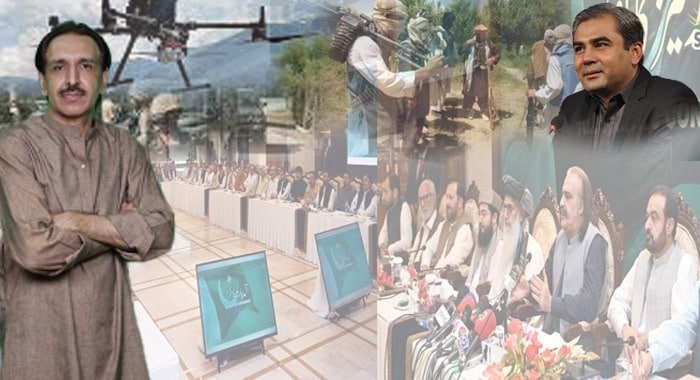The recent All Parties Conference, or APC, convened by the Khyber Pakhtunkhwa (KP) government was, by every serious measure, an opportunity wasted. While it was billed as an inclusive forum to address the province’s deteriorating security landscape, what unfolded was a textbook case of political mismanagement, poor planning, and a dangerously unserious approach to a deeply critical issue.
Let us be clear: there was nothing inherently wrong with the idea of the APC. In fact, given the rising tide of militancy in KP, it was desperately needed. However, the execution was farcical. You cannot expect credible buy-in from political stakeholders when invitations are sent casually over WhatsApp just a day before the event. Where was the traditional political decorum? Where were the outreach efforts to opposition leaders, civil society, and security stakeholders?
Contrast this with how other parties engage the public and political leadership. The Awami National Party (ANP), for instance, sends formal delegations well in advance to build consensus before major events. If a wedding demands proper invitation, surely a conference on peace and national security warrants more.
Instead of fostering unity, the KP government used the APC to posture and score points. The chief minister’s press conference afterwards made it painfully evident that the entire exercise was a veiled attack on the federal government and military establishment. Rather than engaging in honest dialogue, the chief minister offered vague rhetoric and controversial pronouncements like refusing to allow drone operations or federal security intervention in the province.
Worse, the chief minister even questioned the validity of military operations themselves, an alarming stance, especially as KP reels from a deadly wave of attacks in districts like Orakzai, Khyber, and North Waziristan. One must ask: if the government refuses to allow counter-terror efforts, then what is the alternative? Talks? Trade? Border pacts with the same actors destabilising the region?
This raises fundamental concerns. Is the KP government serious about restoring peace, or is it using the security crisis to wage political warfare against Islamabad?
Chief Minister Ali Amin Gandapur’s statements, particularly the outright rejection of future military operations and drone use, were not just irresponsible, they were dangerous. Refusing federal help in counter-terrorism, in a province bearing the brunt of terrorist resurgence, is tantamount to abandoning the people of KP to violence.
Even more baffling was the call to negotiate with banned outfits like the TTP. If the government truly believes peace lies in compromise with militants, it must be honest about the costs. Shall we hand over tribal districts to extremists in exchange for temporary calm? Will the police, already demoralised and refusing front-line duties in areas like Orakzai district, be abandoned in this so-called “peace deal”?
Let me be blunt: military operations have their costs, but peace without resistance is a mirage. Our police, paramilitary, and army personnel are giving their lives to protect this country, they deserve a policy backed by resolve, not retreat.
Much has been said about the opposition parties’ refusal to attend the APC. While I believe they missed a chance to confront the government directly, their reasons were valid. How can one sit at a table when the host is not serious, the agenda unclear, and the effort half-hearted?
Still, I would have preferred that the second-tier leadership of the People’s Party, ANP, JUI-F, and PML-N attended, if only to expose the KP government’s lack of strategy. After all, if you’re going to call out incompetence, it’s better done to the chief minister’s face than from outside the room.
But make no mistake: the failure of the APC lies not with the boycott but with the organisers. What should have been a collaborative platform became a political performance, riddled with contradictions, shallow messaging, and thinly veiled accusations.
The chief minister repeatedly suggests that the federal government is failing KP. Yet trade with Afghanistan has grown by $1 billion under Islamabad’s watch. A new digital system to formalise cross-border trade is in place. And two senior federal delegations have recently visited Kabul to address cross-border security.
Moreover, when Interior Minister Mohsin Naqvi summoned a meeting on KP’s security, stakeholders from across the spectrum, including Aimal Wali Khan, Aftab Sherpao, and Professor Ibrahim, attended. Why? Because they were invited properly and taken seriously. You get respect when you extend respect.
Unfortunately, the KP government shows no such inclination. They contradict each other publicly, with one minister saying security is not their job and the other denying federal help. In such a state, how can they claim to be leading the fight against terror?
If this government is serious, it should abandon theatrics and call for a proper Apex Committee meeting. Involve the military, civil administration, and elected representatives. Give the public transparency about operations underway, whether in Khyber, Peshawar, or Waziristan.
Most importantly, stop weaponizing security for political gains. The people of KP deserve more than finger-pointing and misplaced bravado.
This is not a game. Soldiers are dying. Civilians are suffering. And if political leaders don’t rise to the occasion, history, and the people, will remember who failed them.





